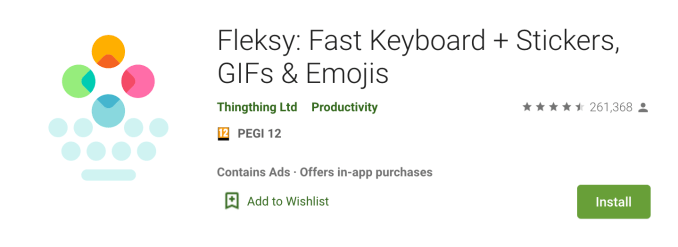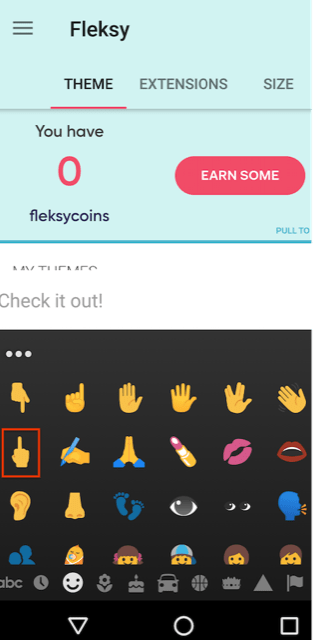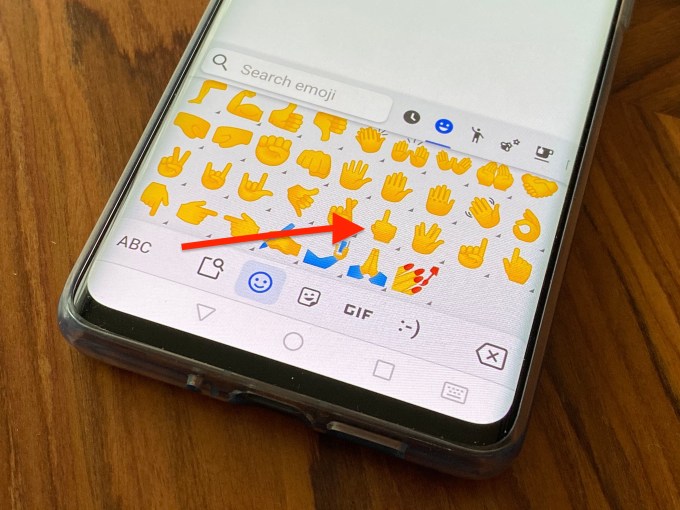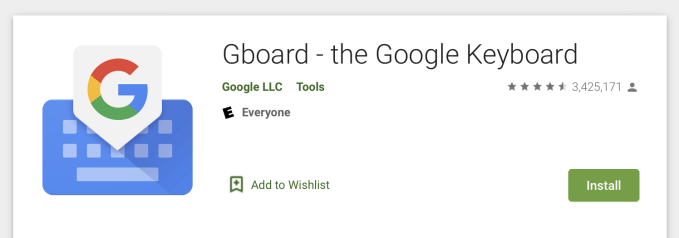Barcelona-based mobile keyboard software maker, Fleksy, has bagged a $1.6 million Series A to cement a pivot to b2b for its white-label SDK for Android and iOS.
The round is led by Spanish asset management firm, Inveready, with follow on funding from some of the startup’s existing investors: SOSV and Simile Venture Partners.
The Series A brings the team’s total raised to date to just under $3M (€2.5M) since the business was founded back in 2015.
The AI keyboard maker has been a long time player in the third party smartphone keyboard space, initially developing a productivity-focused keyboard called ThingThing — before acquiring the assets of better known US-based custom keyboard Fleksy (which had gone into stasis after its dev team got acquired by Pinterest) and making developing Fleksy the full focus.
However monetizing in the consumer custom keyboard space is tough going, with features like next word prediction and swipe inputting now baked into native smartphone keyboards, reducing the value of a third party add-on.
Tech giants like Apple and Google also throw their weight around in peculiar ways. (See, for eg, the flaky implementation of third party keyboards on iOS which helps dissuade users from switching away from Apple’s native keyboard. Or this unfun thing Google’s Play Store did for a while.)
So, last year, Fleksy rolled out an SDK — licensing its keyboard tech to other app makers and businesses who want powerfully predictive, context-specific, custom AI keyboard software which they can tint, brand and adapt in all sorts of ways.
The keyboard SDK could also be used by third parties to learn more about their users and/or seek to drive their own sales.
Among potential features which clients can implement via the SDK that it lists on its website are the ability to bake context-specific advertising into the keyboard (aka, “hyper-contextually suggest products and services or set triggers to show your brand in any app at the opportune moment”); and a forthcoming CRM feature that Fleksy says will “enable shops to send marketing materials, invoices, updates, tasks, and even collect payment from the keyboard.”
Security focused features are also touted as “coming soon” — with custom tweaks that it says could be used to “prevent data leaks and sensitive information from getting out, monitor at-risk employees, Secure messages, prevent fraud.”
Alongside this b2b play, Fleksy continues playing in the consumer space — where it strongly emphasizes user privacy as a differentiator for its software vs alternatives like Google’s Gboard (which sends users’ search data to Google) — and most recently it was trying to entice consumers with art keyboards.
But its center of gravity has clearly shifted to b2b. Hence foregrounding ‘Fleksy for Business’ branding on its website, which has also had a deeptech aesthetic design makeover.
The consumer keyboard will still stick around, though — for the hardcore fans and, doubtless, as a useful showcase/testbed.
“Consumer is hard when the giants don’t compete equally. See Apple mess and Google mess around that. So we found our profitable niche: Helping others build an outstanding keyboard experience and beyond, via license fees,” says Fleksy’s CEO Olivier Plante, who was also CEO and co-founder of ThingThing. “It’s hard to build what we have built, so it’s now a no brainer for these digital companies.”
“Fleksy SDK gives all the tools that a company needs to thrive in their own rationale,” he also tells us when we raise the (privacy) question of how third parties might seek to use its keyboard tech to data-mine their own users. “Fleksy plays a technological role here only. We are not associated with a client’s own privacy stance.”
But he adds: “To be clear, Fleksy Consumer Apps will always be private — we don’t change our rationale there.”
Fleksy says it now has “dozens” of companies licensing its tech — and touts 50 more in its “pipeline”. It also says revenue for its SDK business has grown 10x in a year.
This uplift explains the relatively modest size of the Series A, per Plante.
“We only needed this because we are generating quite a lot of money at the moment,” he tells TechCrunch, adding that the reason for raising a Series A now is to “expand faster”.
The new funding will be used for growth, hiring (to build out its 13-strong team) and to expand its portfolio of clients.
Fleksy’s best markets for licensing the keyboard tech to currently are the US and Europe but Plante says it has customers all over the world.
The SDK is also attracting a broad mix of customers — from digital health and fintech to gaming.
“We have so many leads looking for a keyboard experience — as you can see under /solutions/ on the website — these industries — and even more will all be powered by Fleksy tech,” he suggests.
“We have clients from all types with different needs and because we have built everything in-house — no third party’s black-box — we are able to modify everything for them. Which no other company can provide today. So companies in digital health for example have a profitable company to partner with who has full control over its tech stack,” he adds.
“Fleksy SDK can be modified in many ways: From the layout, dictionary all the way to the core engines that power our autocorrect, predictions, sentiment and more. It’s what makes us the right choice but, as you know, the vision is much larger — ‘Typing on a screen will be typing on Fleksy’ in the future.”
As part of the Series A funding round, Inveready’s Ignacio Fonts is joining Fleksy’s board.
Commenting in a statement, Fonts said: “We are thrilled to join the Fleksy team, which has been able to conquer a worldwide leadership position in keyboard technology, one of the control points of personal computing (phone, mobile, desktops) devices. This round will help them accelerate the development of a very compelling roadmap that will unveil to users new ways to interact with their devices and will provide companies new insights about their customers.”






